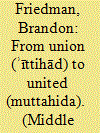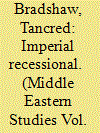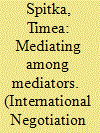| Srl | Item |
| 1 |
ID:
144479


|
|
|
|
|
| Summary/Abstract |
The relationship between India and the United States has transformed significantly since the Cold War, notwithstanding the denial regime imposed after the 1998 nuclear tests. In the complex 21st-century environment, both countries have articulated their strategic outreaches spanning the new geographical construct of a maritime configured Indo-Pacific. This article examines the coherence, correspondence and divergence in the approaches and the institutions of relevance in India's “Act East” and the US “Strategic Rebalance” through the “interest contiguity” paradigm. The salient aspects examined are the politico-diplomatic, economic and military security dimensions, by using a combinational of realist and rational choice theoretical prisms. The paper concludes that while there is a virtual coincidence of “interests’” between India and the US, their approaches and institutional frameworks are different in certain cases, driven by respective geopolitical, geoeconomic and geostrategic imperatives. The emerging positivity in the Indo–US relationship, like many other important engagements across the Indo-Pacific, will continue to contain a mix of cooperation and competition, which is not unusual and offers avenues for further strengthening of coordinated endeavours.
|
|
|
|
|
|
|
|
|
|
|
|
|
|
|
|
| 2 |
ID:
151846


|
|
|
|
|
| Summary/Abstract |
The United Arab Emirates (UAE) was the result of more than three years of failed negotiations to unify the nine pre-state shaykhdoms. Thus, the formation of the UAE may be viewed as a success born of failure. In the period following the 1968 British announcement, the political events that led to the formation of the modern state of the UAE were largely a product of the competition for power or protection between the rulers of the nine pre-state shaykhdoms. This article explains how the personal rivalries and historical animosities between the ruling shaykhs manifested themselves and shaped events that led to the formation of the UAE in 1971.
|
|
|
|
|
|
|
|
|
|
|
|
|
|
|
|
| 3 |
ID:
177687


|
|
|
|
|
| Summary/Abstract |
The British imperial project in the Bahrain, Qatar and the Trucial States originated in the early nineteenth century when the Government of India signed treaties with the rulers of the sheikhdoms. It was a model of low-cost imperialism in which the British secured their economic and strategic interests. Whitehall rarely intervened until the Labour Party came to power in 1964. Domestic economic and political considerations led Harold Wilson to announce in January 1968 that the British would withdraw from the Gulf by the end of 1971. This decision was devoid of any strategic rationale, and was regarded with dismay by the rulers of the sheikhdoms. The rulers were responsible for establishing a political structure, and until the summer of 1970 the Foreign Office left them to their own devices. The election of the Conservative government in June 1970 led to a fundamental re-evaluation of the Foreign Office’s policy and Sir William Luce was appointed to establish a viable political structure for the sheikhdoms. Against the odds, Luce and the Foreign Office played a key role in creating the United Arab Emirates. Bahrain and Qatar became independent states.
|
|
|
|
|
|
|
|
|
|
|
|
|
|
|
|
| 4 |
ID:
163901


|
|
|
|
|
| Summary/Abstract |
The non‐Jewish minority in Israel — Muslim Arabs, Christian Arabs, Druze, Circassians and Bedouins — has been a topic of ongoing research since the establishment of the Jewish state in 1948. The Arab sector is the largest in population. One of the key issues that concern scholars, and the Arabs themselves, is the political array within this minority.
|
|
|
|
|
|
|
|
|
|
|
|
|
|
|
|
| 5 |
ID:
158142


|
|
|
|
|
| Summary/Abstract |
The conditions under which multilateral international intervention are effective in ending a violent conflict is a critical question for scholars and practitioners. Scholarly studies have demonstrated the importance of a united intervention but have been in disagreement over the effectiveness of neutral versus partisan intervention. This article examines the conditions under which mediators construct a consensus on the type of intervention process. What are the factors that enable a consensus on a neutral versus a partisan intervention? Distinguishing between four types of international intervention processes – united-neutral, united-partisan, divided-partisan, and divided neutral and partisan intervention – this article argues that it is a united intervention, whether united partisan or united-neutral, that contributes to creating leverage on conflicting parties to end a conflict. The article examines consensus building among mediators within two divergent case studies: Northern Ireland and Bosnia and Herzegovina.
|
|
|
|
|
|
|
|
|
|
|
|
|
|
|
|